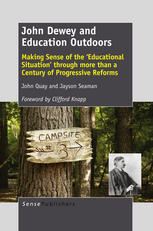

Most ebook files are in PDF format, so you can easily read them using various software such as Foxit Reader or directly on the Google Chrome browser.
Some ebook files are released by publishers in other formats such as .awz, .mobi, .epub, .fb2, etc. You may need to install specific software to read these formats on mobile/PC, such as Calibre.
Please read the tutorial at this link: https://ebookbell.com/faq
We offer FREE conversion to the popular formats you request; however, this may take some time. Therefore, right after payment, please email us, and we will try to provide the service as quickly as possible.
For some exceptional file formats or broken links (if any), please refrain from opening any disputes. Instead, email us first, and we will try to assist within a maximum of 6 hours.
EbookBell Team

0.0
0 reviewsThis is a historical journey with an underlying message for educators, one we are able to illuminate through the educational theories of John Dewey.
Central to this message is a deeper understanding of human experience as both aesthetic and reflective, leading to a more coherent comprehension of not just outdoor education, but of education itself.
Whether we knew it or not, all of us interested in the field of education have been waiting for this book.
John Dewey and Education Outdoors is the tool we need to help understand and explain experiential education in general and outdoor education in particular.
This is an expertly researched and written account of how and why outdoor education has developed, and been such a vital feature in exemplary educational practices.
Because of this work I will no longer have to stumble through some inadequate explanation of the history and philosophy of outdoor education, I can now simply point to this book and suggest that everyone read it. —Dr. Dan Garvey, President Emeritus, Prescott College, Former President and Executive Director, Association for Experiential Education.
John Dewey and Education Outdoors is a well-researched book that explores the tenets of Dewey within the contexts of progressive reforms in education.
The authors provide detailed explanations of Dewey’s thoughts on education while exploring the historical intersections with outdoor education, camping, and environmental education.
While situated within a historical perspective, this book provides insights relevant for today’s discussions on new educational reform possibilities, learning focused on the